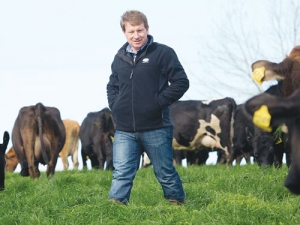Another Windfall for Fonterra Farmers, Unit Holders
Fonterra farmer shareholders and unit holders are in line for another payment in April.
 Fonterra chairman John Wilson predicts market access for dairy products will be up for renegotiation.
Fonterra chairman John Wilson predicts market access for dairy products will be up for renegotiation.
The US dairy interests will realise within five to 10 years they got it wrong by opposing dairy tariff removal in the Trans Pacific Partnership (TPP) negotiations, says Fonterra chairman John Wilson.
Market access for dairy products will go back to the negotiating table for TPP countries within five to 10 years, Wilson predicts. Dairy negotiators in TPP understood the benefits "but were not brave enough to show the leadership to transition their sectors into total trade elimination," Wilson says.
Other countries will want to join the TPP and Wilson predicts within five to 10 years dairy tariff elimination will be looked at again.
"The problem is we have very strong protectionist lobby groups focused on how dairy, for example in the US, has operated over the last decade rather than what the potential is for the future," Wilson says.
"The dairy industry in the US will look on this in five or 10 years and recognise the TPP got this wrong -- that they should have been driving far harder for total tariff elimination alongside New Zealand and Australia. They are already the biggest exporter within the TPP region; they export more than we do in dairy within the TPP region.
"They already export 15% of their production; that is already about three quarters of NZ's production, so they are already a significant exporter globally as well.
"So, a huge opportunity for their exporters; but their exporters tend to be more on the West Coast and the protectionist group is more in the Midwest or towards the north-east and, given how difficult this whole negotiation became politically -- not just in dairy but in autos, biologics, tobacco, sugar and rice -- that ambition of tariff elimination unfortunately hasn't won the day."
Regardless, it is important that TPP has been concluded and must now be enacted, says Wilson. "I have great confidence that within five to 10 years our negotiators will be renegotiating market access because there will be other countries that want to enter TPP and the political and economic environments will be different. There is a greater chance you will continue to get elimination of tariffs at a greater rate than at the moment."
NZ's beef sector got a good outcome because they worked with the other beef sectors around the world particularly led by the US cattlemen, says Wilson. They came up with a good agreement among themselves and were able to work alongside their negotiators.
"While we tried hard to do that with the US dairy industry, unfortunately the US dairy industry took a protectionist approach ultimately, rather than showing leadership on tariff elimination," Wilson says. "That's not unique to dairy; it happened in other cases, for instance sugar."
Wilson says the principle of tariff elimination is now deeply embedded. They have eliminated tariffs over time through many product lines, but not all, in a number of countries.
"We've got to continue this conversation and this pathway. With all trade negotiation, it is not necessarily the next 10 years that benefit, it is the next half generation of people who come along, particularly farmers who will benefit from it, and that's the importance of continuing this work."
Wilson says there won't be any details out for a while – the text is not due for a few weeks. The negotiators say there will be about $100m more of dairy trade for NZ.
"While we have strong indication from our negotiators of what the content is, until the final text has all been thrashed out we don't actually know exactly what the outcome is," he says. "We know what the direction of travel is, but the exact tonnage and the exact time period, and exact product lines -- we don't have detail of those yet.
"The good news is there is more access for a whole lot of NZ primary products – wine, beef and a few others.
"For dairy unfortunately we are in a position where tariff elimination was what TPP was all about but over the last two years, tariff elimination was taken off the table by Japan, Canada and the US industry.
"The deal is disappointing because we haven't got total tariff elimination and we've only got it on a number of product lines, but it is still a better position than we were in last week."
The Meat Industry Association of New Zealand (MIA) today announced that Chief Executive Officer Sirma Karapeeva has resigned from the role.
The winners of the 2026 Hawke’s Bay/Wairarapa Dairy Industry Awards were announced at the annual awards dinner held at Copthorne Solway Park in Masterton on Thursday evening.
Environment Southland is welcoming this week’s decision by the Environmental Protection Authority (EPA) to approve the release of Blaptea elguetai, a leaf‑feeding beetle that will help control the highly invasive Chilean flame creeper.
This March, the potato industry is proudly celebrating International Women’s Day on 8 March alongside the International Year of the Woman Farmer, recognising the vital role women play across every part of the sector — from paddocks and packhouses to research, leadership, and innovation.
Fruit trader Seeka posted a record profit and returns to shareholders in 2025.
Recent weather events in the Bay of Plenty, Gisborne/Tairawhiti, and Canterbury have been declared a medium-scale adverse event.
OPINION: Staying with politics, with less than nine months to go before the general elections, there’s confusion in the Labour…
OPINION: Winston Peters' tirade against the free trade deal stitched with India may not be all political posturing by the…